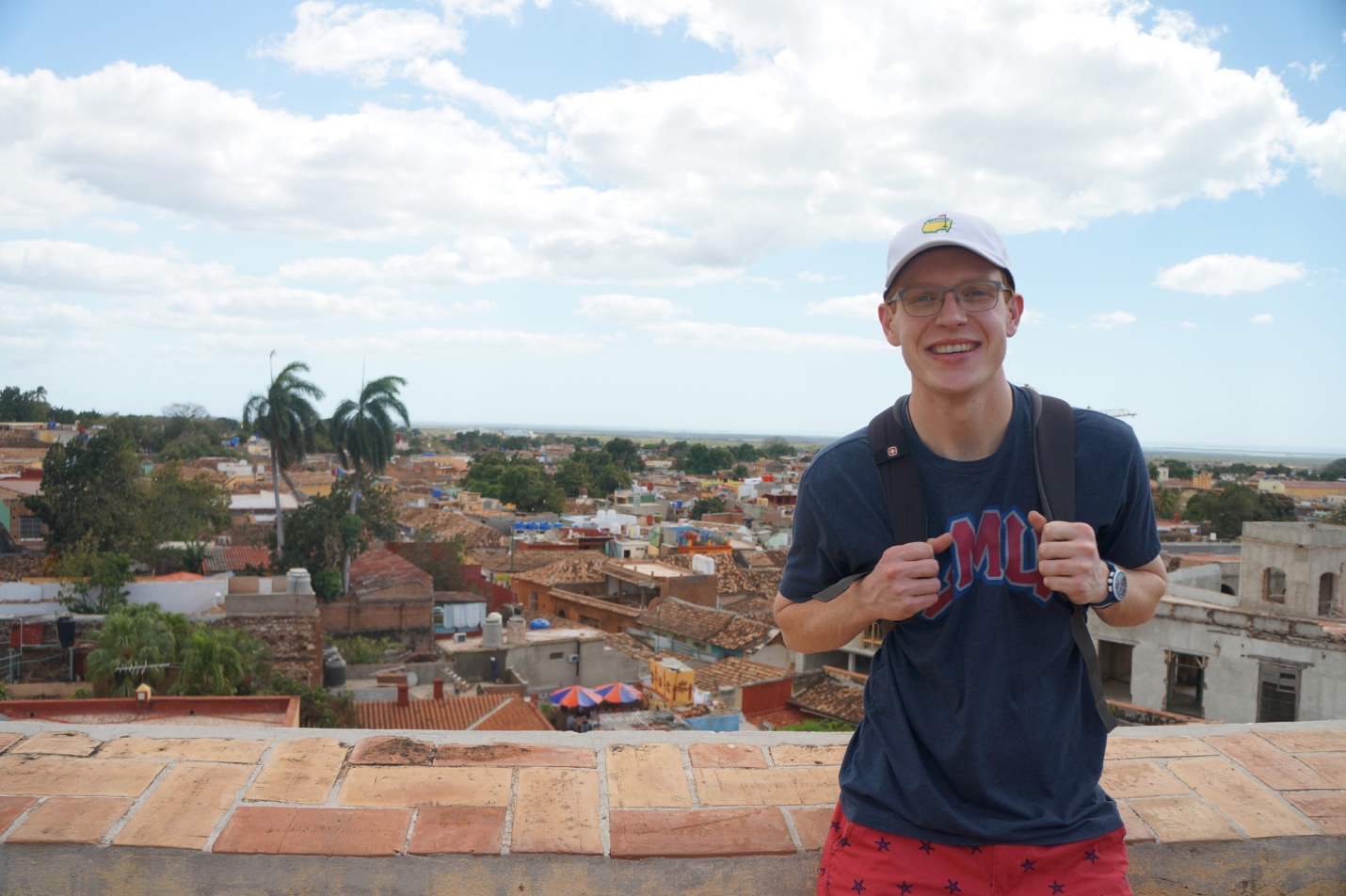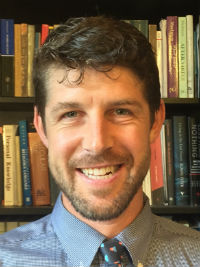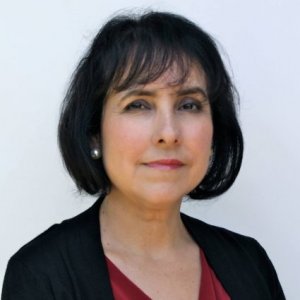Ignacio Companion Service Trip to Cuba

Written by Troy Kassien
On the back of Campus Ministry's De Colores t-shirts there reads a quote from the late Jesuit Superior General Peter-Hans Kolvenbach, "When the heart is touched by direct experience, the mind may be challenged to change. Personal involvement with innocent suffering, with the injustice others suffer, is a catalyst for solidarity which then gives rise to intellectual inquiry and moral reflection."
As a theology and philosophy double major I have become accustomed for some time now to the hard work of reading, writing, and critical thinking that my fields of study call me to. What I have come to realize more recently, though, is the special kind of intellectual reflection that is possible only when one steps out of the academy, out of the ivory tower, out of the meetings, lectures, and convocations, and into the real world that is full of real people, living real lives with real problems. This more recent realization is one that came to me during an Ignacio Companion service trip in the spring of 2017 to Havana, Cuba.
On this service trip I, along with nine others, had the opportunity to engage with Cuban professors, Jesuits, social workers, students, and local people. We spent time listening to their story, the story of Cuba, the problems that Cuba is plagued with, the relations between the government and the local religious leaders, and the vast social and economic oppression that the overwhelming majority of Cubans live under. But, with their problems and concerns also came stories of their joys, triumphs, successes, and hopes for the future of Cuba. It was during these organic conversations that often took place over a cafecito and my broken Spanish that my intellect was brought, quite literally, face-to-face with a human person who was dealing with the reality of the social issues that my fields of study enjoy discussing at fancy luncheons in well-decorated rooms in cozy, academic buildings. It was during these conversations in Cuba that I was struck by how separated my own intellect had become from the reality that it often attempts to wrestle with. It was here that I realized how important it is that theologians and philosophers bridge the gap between ideas and people—because good ideas are really only useful when they are affecting good in a world filled with real people.
It was during this trip that my heart was touched, like Fr. Kolvenbach said, by a "direct experience." In these experiences I encountered men and women religious who saw, more clearly than I might ever be able to, the imago dei standing before them; I encountered elderly men and women who had been seemingly forgotten by society and were in need of a meal and a good conversation; I encountered former teachers and professors who gave up careers and long, sought after positions to work for the Church educating people who could never afford to pay them back; I encountered women who were seeking new lives and opportunities for them and their children after years of working as prostitutes on the streets of Havana; I encountered people familiar with government intimidation that was the result of them being "too involved" with the good work of the Church; I encountered in more ways than can be totaled the persona Christi living in those hungry, tired, burdened, forgotten, and trapped people living in Cuba.
All of these experiences challenged the kind of intellectual reflection that I had become accustomed to. Now I realize in a very powerful way the kind of work and life that my disciplines are calling me to. They are calling me to engage people—real human, people—people that can benefit from the kind of work that theologians and philosophers engage in; people whose lives can be altered when good ideas are turned into realities; people who embody the imago dei and possess within them the face of Christ.
My time in Cuba challenged the way I view my studies and the world with which I am engaged. I was invited to view what I have learned in the classroom as something capable of affecting positive change. I now see what I have access to at LMU in the theology and philosophy departments as something more than just an education. My education is a means for helping bring about a better, more loving, more socially conscious, moral world. My education is preparing me to step out into a world that is in dire need of the kind of social action and solidarity that Fr. Kolvenbach recognized to be vitally necessary today. But, as the superior general understood, a personal encounter is often necessary to wake up the intellect to the needs of the world. Cuba was my encounter. And now I realize there is much work to be done. Soon my disciplines will call me out of the classroom and into the world where I will need to continue the hard work of thinking and begin the even harder work of acting.
Collaboration in Research: Fredericks Fellowship

Written by Professor Eric Daryl Meyer
Alex Topper and I were fortunate enough to collaborate on a year-long research project after our proposal was one of two selected for the James Fredericks Fellowship in Comparative Theology. I would like to recount our experience this year, both out of gratitude for the opportunity the Fredericks fellowship affords and to encourage others to propose their own projects for the fellowship.
As soon as I heard about the Fredericks Fellowship, Alex jumped to mind as an ideal partner for a project. As a student in my upper division course, Alex was an enthusiastic participant in class discussions and clearly had broad interests in a wide range of religious traditions. We were both delighted and honored when our proposal was selected.
Alex brought a burning interest in shamanic, indigenous, and esoteric religious traditions around the world. My own research examines the theological construction of boundaries between humanity and animality as they shape face-to-face relationships among earth's creatures. As we talked about the possibility of working together, it didn't take us long to settle on a set of questions that joined our interests together. Feeling the urgency of environmental degradation and its effects on indigenous people around the globe, Alex has committed himself to learning from sources of wisdom outside the mainstream. Likewise, I am interested in thinking about the ways that mountains, trees, rivers, and animals (along with the spirits that attend to them) are not just passive victims of human encroachment, but agents who push back and make demands on us. Drawing together Tibetan Buddhism and indigenous shamanic traditions from the upper Amazon allowed for a broad cross-cultural research project in comparative theology, connected to pressing ecological concerns.
Over the year, I learned a great deal about the cosmologies and sacred practices of religious traditions far from my own area of expertise. Alex has given me a body of knowledge that I will certainly draw on in my own teaching and scholarship in coming years. For his part, Alex developed a new set of critical tools to examine the "ecology" embedded in religious texts and practices.
Alex's project highlighted fascinating parallels between two traditions on opposite sides of the globe. People in both traditions see predatory cats, serpents, and birds of prey not only as co-participants in an ecosystem, but as spiritual agents whose decisions can determine the course of human lives. These nonhuman creatures (among so many others) have knowledge that differs from and transcends human knowledge—and are therefore honored in ordinary interactions. Such profoundly reverential perspectives are invaluable at a time when prevailing global political and economic systems regard the earth and all its creatures as a stockpile of "resources" available for human purposes. Alex's project did not engage the Catholic tradition explicitly, but I can't help thinking that the relationships he described illustrate what it would mean to actually live in the "universal family" of earth's creatures at the heart of Pope Francis' recent encyclical (Laudato Si', §89).
The Love in the Cardboard Box

Written by Professor Cecilia González-Andrieu
I had never tasted anything so delicious and the memory is such a key to my childhood that for years I kept the box neatly preserved in my closet. In hindsight, the meal was quite ordinary: there was a small piece of cake, a carton of milk (something I had never seen before), and a sandwich. The cardboard box was white and had a large red cross on the lid, it would be a while before I could understand the concept of a "box lunch" and what exactly the Red Cross was. For a refugee child who had waited for asylum for half of my short life, this unexpected meal marked the end of a frightening journey and the beginning of a new life.
We had been up most of the previous night, crowded in small airport rooms with many other exhausted mothers with sleepy small children. My mother only had one lap, so my sisters who were smaller took turns trying to sleep. I wondered around and looked out the window at the beautiful night sky. It was a difficult thing to understand, what was happening to our lives just then. I knew God was up among those stars, and also that the new land where we were going was mysteriously on the other side of the ocean under that same night sky. The next morning, we boarded the first airplane of my life, apprehensively wondering how soon my Dad would come. No one had told us the possibilities of him leaving were slim. The small plane crossed the stretch of ocean separating Havana from Miami faster than anyone imagined. In a flash here we were, in that "land of libertad" our parents had longingly described: the USA.
From my first day of elementary school, I made it my mission to learn as much as I could about my new home. I read U.S. history avidly, I memorized my civics lessons and treasured the loaned books from my parochial school. I got to know "Americans." There was Mr. Fraker who taught us Math and self-reliance, and Mrs. Murray, the English teacher who encouraged our faltering tries without ever belittling our efforts. There were the ESL classes and the bilingual lessons, so I wouldn't fall behind in my other subjects. And for a child suddenly ripped from all they knew, there were the families of my new school friends who invited me over for dinner and gave me my first taste of gingerbread.
Today, as I reflect on the Trump administration's ban on refugees and those being turned away at our airports and our borders, I keep remembering that small box with the Red Cross on it. When it was placed in my hands, a feeling overtook me that told me "there are good people in the world, learn to trust again." When did the United States change so drastically? When did we stop believing in the dreams of the multiple waves of migrants and refugees who made their way here seeking freedom and a better life for over two hundred years? Donald Trump's rhetoric is about making this country "great, " but his actions are heartbreakingly contrary to anything any of ua who came here believing in the dream would call "great." To turn our backs on the vulnerable of the world and to build walls against our neighbors is to deface the very memory of this nation's dreams, to make us trivial, and cowardly, and utterly un-Christian.
I became a citizen as soon as I could. Years later, when I was finally able to travel to Philadelphia for the first time, my recounting for my family of the events that had taken place at Independence Hall drew a small crowd. I was not an official guide, but I loved that story and it had become a part of me. I've been wondering where that spirit has gone, not just since this presidential election, but for many years now. The founding of the United States was quite imperfect, as were its architects. Philadelphia was only the beginning of a brave experiment, not the end. Telling ourselves this country is flawless has created the conditions for the kind of blindness that has brought us to today. We have not loved our nation in spite of its flaws, we have covered over those flaws and allowed them to grow. Immigrants like myself learn quickly that racism, exclusion and poverty will be part of our lives, and yet we persevere, because we have lived imperfect and difficult lives for much too long. To love the United States does not mean to love it only, or to love it blindly. Isolationist nativism is akin to an unhealthy possessive relationship, where we think if we build walls around our beloved they will always belong to us. We will not speak of challenges, of needed growth. We will pretend all's well and lie to ourselves and to the world. Such attitudes are dangerous in interpersonal relationships, they breed sickness and resentment, how much more dangerous when we speak of a nation in the context of a world.
From my earliest memories, until the day I was welcomed by a Red Cross volunteer with a magical box of food I had been a "dissident." Even as a small child, like millions of children today, I had been aware that things were being done in my country that were wrong, shameful and that injured us all. We were broken and to be a dissident meant you wanted to heal such brokenness. I now reclaim that title in defense of the dream of "being created equal" that this land first taught me. What will it mean to be a dissident now? For one thing, it means being called to defend the dignity of all, even those who voted for this administration believing the fool's gold of its shallow greed and possessiveness.
The hundreds of thousands of us, of many faiths and no faith, who these days have converged on airports in defense of immigrants are keeping alive that brave experiment begun in Philadelphia, moving it forward so we can begin to understand our flaws, so we may right them. As I stood at Los Angeles International Airport bearing witness with a group of Jews, Muslims, Catholics and Episcopalians, I spotted a sign carried aloft: "You can't wall all of us in!" In the end, to be a dissident today will mean to share in the fire of passion for God's vision that fueled the people of Israel and nurtured Jesus. We will share the precarious nature of political powerlessness they also experienced, while we meet together and receive the Spirit in upper rooms all over this land. To be a dissident today will mean to finally understand the depth of Jesus' words in the Beatitudes. You are blessed by sharing the fate of the dispossessed and this work will be difficult and painful, but perhaps it will bear the most beautiful fruit within you – you will be the bearer of a box full of love for someone whose dignity has been trampled.
America the beautiful, be beautiful.